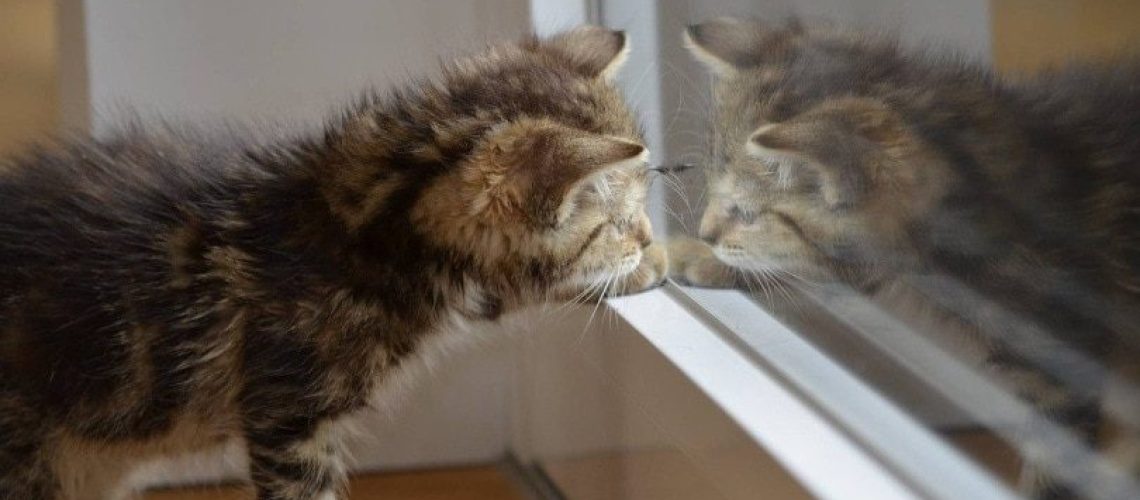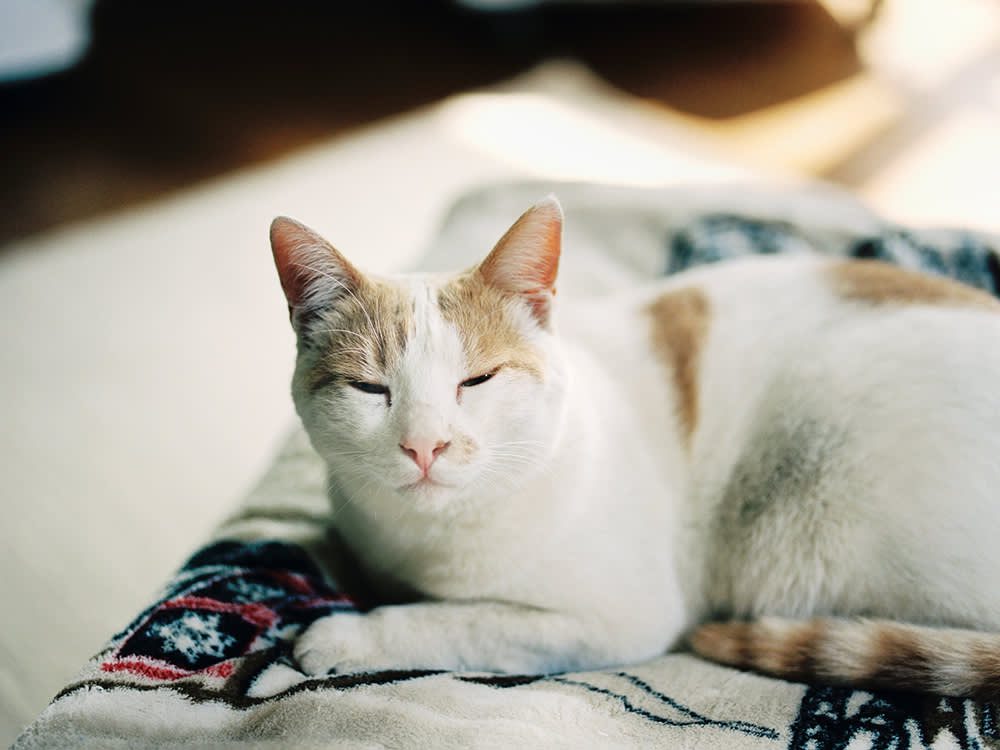Introduction:
Have you ever noticed your furry feline friend staring intently at their own reflection in the mirror? It's a curious sight, isn't it? But have you ever wondered why cats do this and what goes on inside their minds when they encounter their own image? Mirror magic is a fascinating subject that can help us understand our beloved cats better. By unraveling this mystery, we can uncover the secrets behind their behavior and provide them with the care they truly deserve.
Understanding mirror magic is essential because it allows us to delve into the inner workings of a cat's mind. Cats are known for their independent nature, but when faced with their reflection, they often exhibit confusion or even aggression. By comprehending why this happens, we can create a harmonious environment for our furry companions and ensure their mental well-being.
Mirror magic not only helps us decipher our cats' reactions but also sheds light on the incredible intelligence and self-awareness these creatures possess. Did you know that some studies suggest that only a handful of animals, including dolphins and elephants, can recognize themselves in mirrors? Cats may just be one of them! This captivating topic offers an opportunity to explore the depths of feline cognition and discover just how remarkable our feline friends truly are.
So, join us as we embark on a journey into the world of mirror magic and unravel the mysteries behind our cats' fascination with their reflections. Together, let's unlock the secrets hidden within those mesmerizing eyes and gain a deeper understanding of our furry companions.
Key Takeaways:
- Cats may become confused or frightened by their own reflections in mirrors.
- Introducing a mirror gradually can help cats adjust and understand that their reflection is not a threat.
- Providing positive reinforcement, such as treats or praise, when cats are calm around mirrors can help them associate the experience with something positive.
- Avoid forcing cats to interact with their reflection, as this can increase anxiety and stress.
- Redirecting a cat's attention away from the mirror with toys or interactive play can help alleviate any negative reactions they may have towards their reflection.
What is Mirror Magic: Helping Cats Understand Their Reflection?
Mirror Magic is a technique that helps cats understand and feel more comfortable with their own reflection in the mirror. Many cats get confused or scared when they see themselves in a mirror because they don't understand that it's just a reflection of themselves. Mirror Magic aims to teach cats that the mirror image is not a threat.
By using positive reinforcement and gradual exposure, Mirror Magic helps cats realize that the reflection is simply another version of themselves. This can be especially helpful for cats who are anxious or fearful around mirrors, as it allows them to build confidence and trust in their own reflection.
Why do some cats get confused or scared when they see themselves in a mirror?
Cats are naturally curious creatures, but they also rely heavily on visual cues to understand their environment. When a cat sees its reflection in a mirror, it may not recognize itself at first because the image does not have any scent or sound associated with it. This can be confusing for the cat and may trigger fear or defensive behaviors.
In addition, some cats may interpret their own reflection as an intruder or rival cat, leading to aggression or territorial responses. This confusion and fear can be exacerbated if the cat has had negative experiences with other animals in the past.
How understanding reflection can help cats feel more comfortable around mirrors
Understanding how reflections work can help us empathize with our feline friends and assist them in feeling more at ease around mirrors. When light bounces off an object and hits a mirror, it reflects back as an image that appears to be behind the mirror's surface. This reflected image looks very similar to the original object but cannot be interacted with physically.
Cats rely on their senses of smell, hearing, and touch to understand the world around them. Since a mirror reflection lacks these sensory cues, it can be confusing for cats. However, with patience and training, cats can learn that the reflection in the mirror is not a threat and does not need to be feared.
Common behaviors exhibited by cats when they encounter their reflection
When cats encounter their reflection in a mirror, they may exhibit various behaviors. These can include:
- Puffed-up fur or arched back
- Hissing or growling
- Swatting or scratching at the mirror
- Tail flicking or wagging
- Running away or hiding
These behaviors are natural responses to perceived threats or challenges. Cats may display these reactions because they are unsure of what they are seeing in the mirror and interpret it as an intruder or rival.
Do all cats react the same way to mirror reflections?
No, not all cats react in the same way to mirror reflections. Each cat has its own unique personality and experiences that shape its behavior. Some cats may be completely unfazed by their own reflection and show no signs of fear or confusion.
On the other hand, some cats may have a strong reaction to their reflection and exhibit aggressive behaviors. This can depend on factors such as the cat's temperament, past experiences with other animals, and overall level of confidence.
Tips and tricks to help cats adapt to their own reflection
If your cat is having trouble adapting to its own reflection, here are some tips and tricks you can try:
- Start with short exposure: Gradually introduce your cat to the mirror by allowing short periods of exposure. This can help prevent overwhelming the cat and reduce fear or anxiety.
- Use treats and positive reinforcement: Reward your cat with treats or praise when it shows calm behavior around the mirror. This helps create a positive association with the mirror.
- Play with interactive toys near the mirror: Engaging your cat in playtime near the mirror can help distract it from any fear or confusion. The presence of enjoyable activities can make the cat feel more comfortable in its surroundings.
- Provide a safe hiding spot: Place a cozy bed or hiding spot near the mirror so that your cat has a safe place to retreat if it feels overwhelmed. This gives the cat a sense of control and security.
Can Mirror Magic techniques benefit other pets like dogs or birds?
Mirror Magic techniques are primarily designed for cats because they have unique behaviors and sensitivities towards mirrors. However, some similar concepts can be applied to other pets like dogs or birds, although their reactions to mirrors may differ.
Dogs, for example, may be more inclined to approach their reflection out of curiosity rather than fear. Birds, on the other hand, may perceive their own reflection as another bird and display territorial behaviors.
If you want to help your dog or bird understand their reflection better, it's important to observe their reactions and tailor training methods accordingly. Positive reinforcement and gradual exposure can still be effective strategies for helping them adapt to mirrors.
What is Mirror Magic: Helping Cats Understand Their Reflection?
Understanding the concept of reflection
When we talk about reflection, we mean the phenomenon where light bounces off an object and comes back to our eyes. This is how we see things around us. Mirrors are specially designed objects that can reflect light in a way that creates a clear image of whatever is in front of them. So when a cat looks at itself in a mirror, it sees its own reflection.
The confusion and fear cats experience
Now, you might wonder why some cats get confused or scared when they see themselves in a mirror. Well, it's because they don't understand that the image they see is actually their own reflection. To them, it looks like another cat invading their territory! This can be quite intimidating for them and may trigger defensive behaviors.
Why do some cats get confused or scared when they see themselves in a mirror?
The concept of self-recognition
Cats are not naturally aware that the image in the mirror is their own reflection. Unlike humans and some other animals, cats lack self-recognition abilities. They rely more on their senses of smell and hearing to identify others rather than visual cues. So when they encounter their reflection, it's no wonder they become perplexed or even frightened.
Misinterpretation of body language
Another reason for their confusion lies in how cats interpret body language. When two cats meet face-to-face, they use subtle signals like tail flicks or ear movements to communicate intentions and establish dominance. However, when a cat sees its reflection mimicking these gestures, it can misinterpret them as aggressive behavior from another feline.
How understanding reflection can help cats feel more comfortable around mirrors
By helping our feline friends understand the concept of reflection, we can alleviate their confusion and fear. One effective way to do this is by gradually introducing them to mirrors in a controlled environment. Start by placing a small mirror at a distance where they can observe it without feeling threatened. Over time, they will realize that the image in the mirror is not an actual intruder but just their own reflection.
Positive reinforcement
To further reinforce this understanding, you can use positive reinforcement techniques. Whenever your cat shows curiosity towards the mirror or approaches it without fear, reward them with treats or praise. This will create a positive association with mirrors and help them feel more comfortable around these reflective surfaces.
Common behaviors exhibited by cats when they encounter their reflection
When cats encounter their reflection, they may display various behaviors indicating confusion or fear. Some common reactions include:
- Puffed-up fur and arched back: This is a defensive posture meant to make the cat appear larger and more intimidating.
- Hissing or growling: Cats may vocalize aggressively towards their reflection as if warning it to stay away.
- Pawing or scratching at the mirror: This behavior is an attempt to interact with what they perceive as another cat.
- Running away or hiding: Some cats may simply retreat from the situation, seeking safety in familiar hiding spots.
Do all cats react the same way to mirror reflections?
No, not all cats react in the same way when encountering their reflection. Just like humans, cats have unique personalities and temperaments that influence how they respond to different situations. While some may show immediate aggression or fear, others might be indifferent or even playful towards their own reflection. It's important to observe your cat's individual behavior and adjust your approach accordingly.
Tips and tricks to help cats adapt to their own reflection
Gradual exposure and desensitization
To help your cat adapt to its own reflection, start by introducing mirrors in a gradual and controlled manner. Begin with small handheld mirrors and allow your cat to sniff and investigate them at its own pace. Gradually increase the size of the mirror or move it closer over time. This gradual exposure will help desensitize your cat to the presence of its reflection.
Interactive playtime
Engaging your cat in interactive play sessions near a mirror can also be beneficial. Use toys that reflect light or create movement, as this will capture their attention and redirect their focus from any potential fear or confusion towards a positive and enjoyable experience.
Can Mirror Magic techniques benefit other pets like dogs or birds?
While Mirror Magic techniques are primarily focused on helping cats understand their reflection, they can also be applied to other pets like dogs or birds. Dogs, for example, may initially react with curiosity or confusion when encountering their reflection but can gradually learn to recognize it as themselves. Birds, on the other hand, may not have the same level of self-recognition as mammals but can still benefit from gradual exposure to mirrors as a form of mental stimulation. Remember to always consider the specific needs and behaviors of each pet when applying these techniques.
In conclusion, mirrors can be confusing for cats, but with time and patience, they can learn to understand their reflection. By providing a positive environment and using interactive toys, we can help our furry friends feel more comfortable and less threatened by their own image in the mirror.
Do cats understand reflections in mirrors?
Cats do not have the ability to recognize themselves in mirrors. Instead, when they see their reflection, they perceive it as another cat. This is why cats are often fascinated by their own reflections. The reason for this lack of self-awareness in cats is relatively simple.
Why do cats fight their reflection in a mirror?
According to Burch, there are cases where cats may not recognize their own reflection and mistake it for another cat. In these situations, cats may see their reflection as a threat and view it as an intruder. As a result, cats may scratch at the reflection to defend their territory.
Can cats learn mirrors?
According to Popular Science, cats do not actually have the ability to recognize themselves in the mirror, despite what is often shown in cat videos or observed in your own home.
What happens if you show a cat its reflection?
Certain cats pay no attention to their reflection, while others may be curious and question why the other cat lacks a distinct scent. Some cats may even display aggression or fear when they see their own reflection. If your cat has a negative reaction, there are ways to assist them.
What do cats think when we kiss them?
Cats do not perceive kisses in the same manner as humans do because they have a different understanding of emotions and display affection in their own unique ways. However, some cats may recognize that a kiss is a human gesture of love and affection, although individual preferences may vary.
Do mirrors stress out cats?
Just like other animals, cats are unable to recognize themselves in a mirror. Instead, they may see their own reflection as another unfamiliar cat, which can be confusing for them since they don't detect their usual scent. In these situations, your cat may either defensively attack the mirror or quickly escape from it.

















